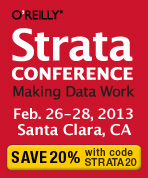Over Thanksgiving, Richie and Violet asked me if I preferred the iPhone or the Galaxy SIII. I have both. It is a long story. My response was, “It depends.” Richie, who would probably bleed Apple if you cut him, was very unsatisfied with my answer. Violet was more diplomatic. Yet, it does depend. It depends on what the user wants to use the device for.
I say, “It depends” a lot in my life.
Both in the personal life and the work life … well, because it really is all one life isn’t it? With my work over the past decade or so, I have been obsessive about being user-focused. I spend a lot of time thinking about whom a product, feature, or service is for and how they will use it. Not how I want them to use it — how they want to use it and what problem they are trying to solve with it.
Before I joined O’Reilly, I was obsessively focused on the audience for my data analysis. “C” level execs look for different kinds of insights than a director of engineering. A field sales rep looks for different insights than a software developer. Understanding more about who the user or audience was for a data project enabled me to map the insights to the user’s role, their priorities, and how they wanted to use the data. Because, you know what isn’t too great? When you spend a significant amount of time working on something that does not get used or is not what someone needed to help them in their job.
If there were a Data Analysis Anonymous support group, I’d bet that one of the top challenges discussed would be dealing with spending so much time, resources, and err … funding on unused data projects. This also crosses over to other roles within multiple industries. Just think about how many products, services, and additional features have been launched into the market and no one uses them. Each unused feature or product may represent hundreds, if not thousands, of human work hours. Wasted.
Since I’ve joined O’Reilly, a variation of the question “how do we help people become data scientists?” has come up every day. As the Strata editor, this is a question I should be thinking about every day … even at 12:48 AM staring at my ceiling or writing a Strata piece on a Saturday afternoon at a local cafe. My response often is, unsurprisingly, “it depends.” There is no single path to becoming a data scientist. Saying that there is only one path to becoming a data scientist is like saying that all product directors started their careers with Ph.Ds in computer science and electrical engineering. Ummmm. Yeah. So not the case.
At a very broad level, everyone interested in careers in data science will need to be familiar with some math, programming, tools, design, analysis … and wait for it … empathy. As in, empathy for the users of your data projects. Ooooh, I can already envision the hatertude that is going to fill my inbox with my empathy recommendation. Please feel free to bring it on. You can reach me here.
Anyway.
How deep you need to go into each category depends on your background (i.e., quant, qualitative analyst, designer, software engineer, student, etc.) and what kind of work you want to do (i.e, open source, startups, government, corporate, etc.).
O’Reilly has a data science starter kit that is a great bundle that provides insight into the broad technology categories. In the future, I’ll provide additional suggestions on the types of resources users can reference to help them with their path toward learning more about data science, and if they want, becoming a data scientist. Within the Strata community site, I’ll be seeking to answer questions like:
- “I’m currently a quant that works a lot with mySQL and am interested in data science. Now what?”
- “I am a software developer. Do I really need to learn any more math? Seriously?”
- “I’m currently a graphic designer. What should I learn about data science in order to bring additional meaning to my design?”
- “I think I want to get my Ph.D in math. Probably statistics. What else should I think about while I complete my studies if I want to be a data scientist when I grow up?”
- “I am a business intelligence analyst that works primarily with Excel. What other skills do I need to become a data scientist?”
These won’t be the only questions. I’ll also be seeking to provide insights to even more questions from many different types of users who are interested in data science. Keep a lookout for future postings from me and friends of O’Reilly that will provide more detailed recommendations. While I plan to cover quite a wide range of topics within the Strata community, insight into the multiple types of user-centric learning journeys needs to be addressed.
If you have any ideas or suggestions on which learning journeys should be written about first, please feel free to let me know at pitchstrata@oreilly.com.
 Strata Conference Santa Clara — Strata Conference Santa Clara, being held Feb. 26-28, 2013 in California, gives you the skills, tools, and technologies you need to make data work today.
Strata Conference Santa Clara — Strata Conference Santa Clara, being held Feb. 26-28, 2013 in California, gives you the skills, tools, and technologies you need to make data work today.



